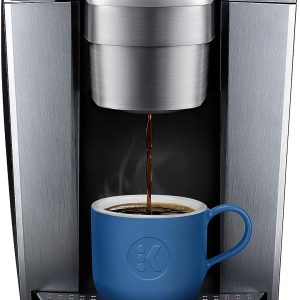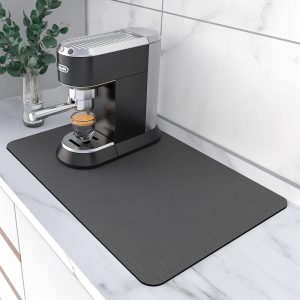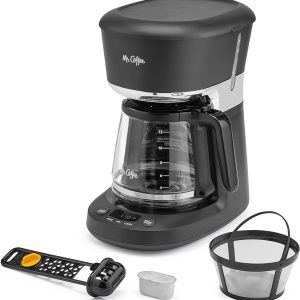Coffee Machines: Revolutionizing the Coffee Experience
In today’s fast-paced world, coffee has become an integral part of our daily lives.
From the moment we wake up to the late-night study sessions, a cup of coffee is often our trusted companion.
But have you ever wondered how the coffee machines we use affect the perception of coffee quality?
In this article, we will explore the fascinating influence of coffee machines on the taste, aroma, and overall experience of enjoying a cup of coffee.
From traditional drip brewers to cutting-edge espresso machines, we will delve into the science behind these machines and how they shape our perception of coffee.
So grab your favorite mug, sit back, and let’s dive into the world of coffee machines and their impact on the coffee we love.
The Science Behind Coffee Extraction
To understand the influence of coffee machines on coffee quality, we must first delve into the science behind coffee extraction. When hot water comes into contact with coffee grounds, a complex process occurs, where various compounds are extracted from the grounds and dissolved into the water. This extraction process is influenced by several factors, including water temperature, brew time, grind size, and the pressure applied during extraction.
Different coffee machines employ different methods of extraction, which can significantly impact the final taste and aroma of the coffee. Let’s explore some of the most common types of coffee machines and their effects on coffee quality:
1. Drip Brewers: Drip brewers, also known as filter coffee machines, are a popular choice for many coffee enthusiasts. These machines work by pouring hot water over a bed of coffee grounds, allowing the water to slowly drip through a filter and collect in a carafe below. Drip brewers typically use medium-coarse grind size and rely on gravity to extract the coffee compounds. The resulting brew is often clean, smooth, and well-balanced, with subtle flavors and a medium body.
2. Espresso Machines: Espresso machines are a staple in coffee shops and homes of espresso aficionados. These machines use high pressure to force hot water through finely ground coffee, resulting in a concentrated and intense shot of espresso. The pressure applied during extraction in espresso machines allows for the extraction of a higher concentration of coffee compounds, including oils and solids. This leads to a fuller body, bolder flavors, and a characteristic crema on top of the espresso.
3. French Press: The French press, also known as a plunger or press pot, is a manual brewing method that involves steeping coffee grounds in hot water and then pressing a plunger to separate the brewed coffee from the grounds. This method allows for a longer brew time and a full immersion of the coffee grounds, resulting in a rich and robust cup of coffee. The French press tends to produce a heavier body and more pronounced flavors compared to other brewing methods.
4. Single-Serve Pod Machines: Single-serve pod machines, such as those that use coffee capsules or pods, have gained popularity for their convenience and consistency. These machines work by puncturing a pre-packaged pod containing coffee grounds and passing hot water through it. While they offer ease of use and minimal cleanup, the quality of coffee produced by pod machines can vary depending on the brand and type of pod used.
As we can see, each type of coffee machine has its own unique way of extracting flavors from coffee grounds, resulting in distinct characteristics in the final cup. The choice of coffee machine can greatly influence the taste, aroma, body, and overall perception of coffee quality. However, it is not just the machine itself that plays a role; other factors such as coffee bean quality, roast level, and water quality also contribute to the overall coffee experience.

Perception and Psychological Factors
The perception of coffee quality is not solely determined by the brewing method or the coffee machine used. Various psychological factors also come into play, shaping our perception of taste, aroma, and overall enjoyment of coffee.
1. Expectations: Our expectations greatly influence how we perceive the taste and quality of coffee. If we have high expectations based on the reputation of a particular coffee machine or brand, we are more likely to perceive the coffee as superior, even if the actual taste may not be significantly different.
2. Presentation: The visual presentation of coffee, including the color, crema, and overall appearance, can significantly impact our perception of quality. A well-made espresso with a rich crema or a perfectly brewed pour-over coffee with a clean and vibrant appearance can enhance our perception of the coffee’s quality.
3. Context and Environment: The context in which we consume coffee and the environment in which it is served can also influence our perception. Enjoying a cup of coffee in a cozy café with pleasant ambiance and good company can enhance our overall experience and make the coffee taste better.
4. Personal Preferences: Each individual has unique taste preferences when it comes to coffee. Some may prefer a bold and intense flavor profile, while others may prefer a milder and more balanced taste. These personal preferences can influence how we perceive the quality of coffee brewed by different machines.
It is important to note that while coffee machines can contribute to the overall coffee experience, they are not the sole determinant of coffee quality. The choice of coffee beans, their freshness, the grind size, and even the water used all play crucial roles in the final cup of coffee.
Furthermore, the skill and technique of the person operating the coffee machine also have a significant impact on the quality of the brew. A skilled barista can extract the best flavors from the coffee grounds, regardless of the type of machine used.
In conclusion, the perception of coffee quality is a complex interplay between the coffee machine, the brewing method, psychological factors, personal preferences, and various other variables. While coffee machines undoubtedly influence the taste, aroma, and overall experience of coffee, it is essential to consider the holistic picture and not solely rely on the machine itself. So, the next time you savor a cup of coffee, take a moment to appreciate the intricate dance between the machine, the beans, and your own perception.
Advancements in Coffee Machine Technology
Over the years, coffee machine technology has evolved significantly, leading to advancements that have further enhanced the perception of coffee quality. Let’s explore some of the notable advancements in coffee machine technology:
1. Temperature Control: Temperature plays a crucial role in coffee extraction. Modern coffee machines are equipped with advanced temperature control systems that ensure the water is heated to the optimal temperature for extracting the desired flavors from the coffee grounds. This precise temperature control allows for consistency and enhances the overall quality of the brew.
2. Pressure Profiling: Some espresso machines now offer pressure profiling capabilities, allowing baristas to control the pressure applied during extraction at different stages. This level of control enables them to experiment with different extraction profiles, resulting in unique flavor profiles and a more personalized coffee experience.
3. Grind Size Consistency: Consistency in grind size is crucial for achieving an even extraction. Coffee machines with built-in grinders now offer precise control over grind size, ensuring uniformity and eliminating the need for a separate grinder. This consistency contributes to a more balanced and flavorful cup of coffee.
4. Automated Brewing Parameters: Many modern coffee machines come with pre-programmed brewing parameters for different coffee styles, such as espresso, cappuccino, or pour-over. These automated settings take the guesswork out of brewing and allow users to consistently achieve their desired coffee profiles with just a touch of a button.
5. Specialty Coffee Compatibility: With the rise of specialty coffee, coffee machines have adapted to accommodate the unique requirements of these high-quality beans. Some machines offer customizable brew settings, allowing users to adjust variables such as brew time, water flow rate, and pre-infusion, to bring out the best flavors in specialty coffees.
6. Connectivity and Smart Features: Coffee machines are now incorporating smart features and connectivity options. Users can control their machines remotely through smartphone apps, adjust brewing parameters, and even receive notifications when their coffee is ready. These advancements not only add convenience but also enable users to have greater control over their brewing process.
These advancements in coffee machine technology have undoubtedly elevated the coffee brewing experience. They allow for greater precision, consistency, and customization, resulting in a higher perceived quality of coffee. As technology continues to evolve, we can expect even more exciting innovations that will further enhance our enjoyment of this beloved beverage.
In conclusion, the influence of coffee machines on the perception of coffee quality is undeniable. From the science behind coffee extraction to the psychological factors that shape our perception, coffee machines play a significant role in determining the taste, aroma, and overall experience of enjoying a cup of coffee.
We have explored the different types of coffee machines and their unique methods of extraction, ranging from drip brewers to espresso machines, French presses to single-serve pod machines. Each machine offers its own set of characteristics and flavors, allowing coffee enthusiasts to choose the brewing method that best suits their preferences.
However, it is important to remember that coffee quality is not solely dependent on the machine itself. Psychological factors such as expectations, presentation, context, and personal preferences also contribute to our perception of coffee quality. The skill and technique of the person operating the coffee machine, as well as the quality of the coffee beans and water used, are equally important in achieving a delicious cup of coffee.
Advancements in coffee machine technology have further enhanced the perception of coffee quality. Temperature control, pressure profiling, grind size consistency, automated brewing parameters, specialty coffee compatibility, and smart features have all contributed to a more precise, consistent, and customizable brewing experience.
As we continue to explore and innovate in the world of coffee machines, the question arises: Can a coffee machine truly replicate the experience of a skilled barista? While machines can produce excellent coffee, there is an artistry and human touch that a barista brings to the process. The passion, expertise, and attention to detail that a skilled barista possesses cannot be replicated by a machine alone.
So, as we embrace the convenience and advancements of coffee machines, let us also appreciate the artistry and craftsmanship that goes into creating a truly exceptional cup of coffee. Can a machine ever replace the human touch in the world of coffee?






